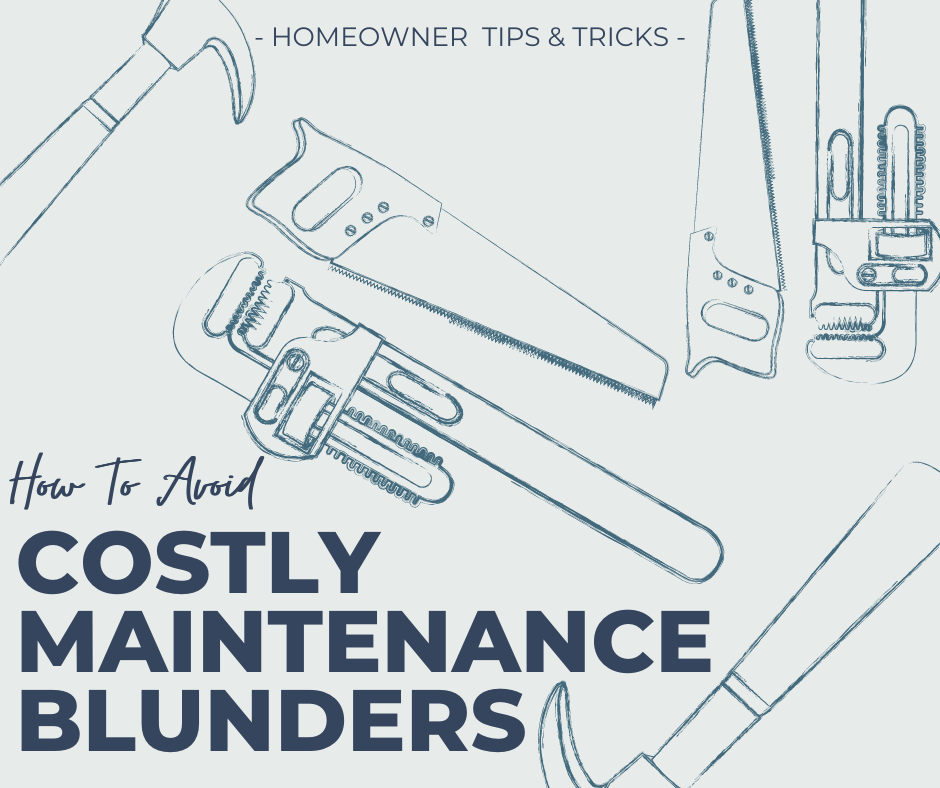
When you become a new homeowner, there’s a lot of work to be done. You have walls to paint, furniture to buy, and dinner parties to host. It’s easy to let preventative home maintenance tasks fall to the bottom of your to-do list. However, it’s essential to plan your home maintenance budget and get started with preventative tasks, so you don’t blow your savings when major problems arise.
Spend Money to Save Money
Many new homeowners put off maintenance because of the cost. The benefit isn’t always apparent, but you should think of it more like insurance— spend a little upfront so that you’re not wiped out later on if something happens.
Maintenance costs vary from year to year, but if you want to be safe, set aside at least 1% of your home’s initial price for your home maintenance budget. You may spend just a couple hundred dollars some years, but having a reserve fund will prevent you from being blindsided by a major project, like a new roof or tree removal.
Maintenance Musts
Although you can handle plenty of projects on your own, some maintenance tasks require an expert with specialized equipment. When planning your home maintenance budget, keep in mind these essential tasks:
Furnace & Air Conditioning: Change your filters regularly and replace them every three months. Dirty filters slow down air flow and waste energy. Plus, dirt buildup can lead to system failures or maintenance issues.
Consider getting a service contract with a company to provide routine HVAC system maintenance. They should come out every spring and fall to ensure it’s ready for the cold winters or hot summers. With a contract, you’ll get priority service if an emergency arises.
Plumbing: Keep your eye out for leaks in your walls, ceilings, and especially around your appliances. Even a tiny leak can lead to a significant disaster if it’s not taken care of. Carefully inspect older plumbing, especially on the second floor, and hire a plumber for jobs you know you can’t handle.
Electrical Systems: One of the first things you should do when moving into a new home is to ensure your electrical system is up-to-date and safe. Consult an electrician and make sure you have dedicated circuits for appliances and adequately grounded outlets. Your family’s safety is a top priority— the cost of an electrician is well worth it. Unless you have proper training, don’t attempt electrical work yourself.
Windows: Clean your home’s windows and screens at least once a year. It’s best to do this in the spring or fall. In addition to cleaning, check the caulking around your windows and fill in gaps to air leakage and water damage. The process can be time-consuming, but if you’re able to put in the work, you’ll save a lot of money by doing the job yourself.
Roof: Fix damaged or missing shingles to prevent leaks and mold in the attic. Have a roofer come out every few years to caulk, repair, and seal whatever looks worn out. This can extend the life of your roof for years.
Chimney: If you use your chimney regularly, clean it thoroughly at least once a year. Examine the exterior for loose bricks and mortar to avoid water damage.
Even if you don’t use (or have) a fireplace, make sure to line your chimney. Many heating systems vent through a chimney.
Gutters & Downspouts: Keep these cleaned regularly in spring and fall (when debris and leaves are most likely to pile up). Hire a professional if you’re not confident climbing high ladders!
Shrubbery & Yard Work: Keep your trees trimmed and healthy. Dead trees are dangerous, and weak branches break easier than you think! You don’t want any surprises during a storm, so hire a professional company to care for your trees and trim them when necessary.
Similarly, overgrown bushes need maintenance. They can be a comfy home for mice, and other creatures, so keep them neat and trimmed below window level.
Decks & Driveways: Follow your deck’s maintenance instructions each year— this might include cleaning with a mild bleach solution to prevent mold. Pressure-treated decks can become dry and splintered, so stain or seal regularly. Pull weeds from patios before they take root and cause damage.
Appliances: Keep track of the age of each appliance in your home. As silly as it sounds, read the user manual or do a web search for your model to learn about proper care and maintenance. Your appliances will last longer and function better over time if you take care of them and service them regularly.
If you need recommendations for any pros to help with the above, please reach out!
Make it Easy — Schedule and Record It
Having a budget isn’t any good if you don’t actually do the maintenance. Create a monthly schedule, so you don’t get behind. Keep a record of maintenance tasks, purchases, warranties, and receipts. There are several apps that make it easy to keep track on your phone! No matter what system you use, make sure your records contain the following information:
- Repair dates
- Contractor information
- Store receipts
- Model numbers
- Manufacturer information
Preserve the Value of Your Home
Your home is likely your biggest investment, and you want to ensure it retains its value. A poorly kept home can lose up to 10% of its appraised value. When you sell your home, you don’t want major issues to drag down your selling price. You control this outcome, so start today on your home maintenance budget and make a plan!
If you need any recommendations for contractors or service providers, I’m happy to give you my list of trusted professionals in your area! Get in touch with any questions.
Hi, there!
I'm Lauren Haug! I'm a teacher-turned-real estate agent, and I teach people how to build wealth through real estate in Northern Colorado.
Let's Meet
Contact
970-685-9460
lauren@sweetheartcityliving.com
Buy
My Listings
Sell
All Articles
schedule your free consultation